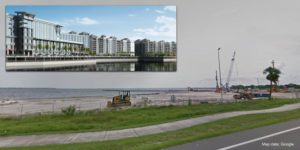
At least 24 unpaid construction work claims worth nearly $20 million are the latest developments in the saga of the coronavirus-plagued Sunseeker Resort project in Port Charlotte, Florida, which has experienced a work stoppage since March.
Subcontractors hired to work on the $420-million, 22-acre luxury destination developed by Las Vegas-based airline Allegiant Travel Company have filed for $18.3 million in mechanics liens against the general contractor, the project’s construction manager, and other subcontractors as of October 2020.
The project’s general contractor — Allegiant Travel Company’s subsidiary, Point Charlotte Development — is linked to six unpaid work claims worth $14.7 million.
Meanwhile, the project’s construction manager, Suffolk Construction, has been subject to at least two mechanics lien claims totaling $753,166.50 as of June 2020.
When faced with non-payment, contractors can file mechanics liens against a property’s title. By doing so, an active lien can prevent the property owner from selling or refinancing the land until the lien claim has been paid for.
As of March when the project was hit with COVID-19 shutdowns, Engineering News-Record (ENR) reported the project would house two-to-three buildings, with a 277-room hotel serving as the property’s centerpiece.
In October, Allegiant Travel Company announced in a press release that they had spent $15 million in closing a loan agreement to develop the Sunseeker Resort.
A statement on the Sunseeker Resort’s website states “Our priority is always your health and safety. Because of the evolving COVID-19 (Coronavirus) pandemic, we are saddened to inform you we have halted all work on [the] Sunseeker Resort Charlotte Harbor until further notice.”
Spokesmen from Allegiant Travel Company and Suffolk Construction could not be reached for comment.
All 24 mechanics liens were processed with the Charlotte County clerk’s office pursuant to Florida mechanics lien statutes.
24 liens filed by 21 contractors at the “closed down” Sunseeker Resort project
As of early October 2020, at least 21 different contractors have filed 24 mechanic’s lien claims against the Sunseeker Resort, located at 4949 Tamiami Trail, Port Charlotte, FL.
The 21 contractors allege that they are owed a combined $18,309,647.50 for their work at the luxury resort.
Five the largest active mechanics lien claims alone total a combined $14,795,242.60 in unpaid construction work to date.
Subcontractor Ceco Concrete Construction has filed the largest three lien claims against the project, totaling a combined $12.9 million as of October 9.
Each of Ceco Concrete Construction’s liens were filed against Point Charlotte Development.
Ceco Concrete Construction is now facing at least 16 mechanics lien claims from unpaid subcontractors from the Sunseeker Resort project, totalling a combined $2.7 million.
A Ceco Concrete Construction representative from the subcontractor’s Tampa, Florida office told Levelset in November, “The [Sunseeker Resort] project has closed down. We are not discussing that project at this time.”
According to Ceco Concrete Construction’s lien filing, the subcontractor’s contract with Point Charlotte Development was worth $29 million.
Allegiant Spends $15M to end loan agreement to develop Sunseeker Resort
Already hammered with economic hardships due to the coronavirus and its negative impact on the travel and entertainment industries, Allegiant Travel Company has added another expense to their costly 2020 financial year due to their involvement at the Sunseeker Resort.
Allegiant Travel Company’s Third Quarter 2020 Financial Results report states that the company paid $15 million to close out a loan with lender Sixth Street Partners, previously known as TSSP, in developing the luxury resort.
The buyout from Allegiant is equated to “an early termination fee” from WINK news, a Fort Myers, FL network.
“They are using this as a way to minimize their cash flow,” said Tom Smythe, a finance professor at Florida Gulf Coast University during an interview with WINK in October. “They’ve evaluated it over the long term and see that as a better option.”